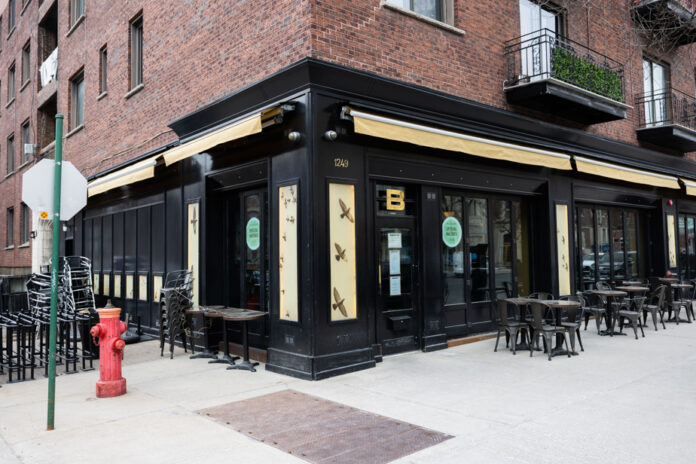Considered an extremely lucrative holiday, the Easter weekend was instead synonymous with financial losses of tens of thousands of dollars for restaurants without electricity due to the ice storm.
“We lost everything,” says Nathalie Côté, co-owner of La Brasserie Bernard. Flank steak, salmon, shrimp, oysters: the Outremont restaurant’s fridges were full and a lot of preparation had been done in the kitchen in anticipation of the long Easter holiday. But the power outage that hit the establishment from Wednesday to Sunday ultimately resulted in food losses valued at $15,000. The foodstuffs that were supposed to end up on the customers’ plates finally ended up in the trash.
In addition to food, Ms. Côté, who was expecting a busy weekend, incurred other losses. “It’s also sales that we haven’t made and I have employees who have lost their salaries. »
In principle, La Brasserie Bernard was to reopen on Monday, but Nathalie Côté and her chef, Maxime Gauthier, had to resign themselves: they were not ready. Same scenario for the Tuesday noon service. The fridges were empty. “We had to replenish the stocks. »
Mrs. Côté will make a claim with her insurance to try to be reimbursed for some of her losses. However, she has little faith in her chances of receiving compensation.
Further north, in the Villeray district, Victor Afonso, co-owner of the Tapeo and Mesón restaurants, also experienced the inconveniences of the breakdown. “You always live in hope that the electricity will come back,” he says. But the restaurateur’s wish was unfortunately not granted. Thus, he calculates having thrown away between $5,000 and $10,000 worth of food.
And since he was unable to welcome customers to his establishments on Thursday and Friday evening, Mr. Afonso estimates that he was deprived of approximately $50,000 in sales. According to him, the insurance companies will refuse to reimburse him since these losses are linked to a “natural cause”.
On the side of the St-Hubert Group, about thirty restaurants had to close, confirms the director of communications, Josée Vaillancourt. “We had to resort to generators and refrigerated trucks so as not to lose food. Some franchisees had record sales while others were closed and provided their groceries to their colleagues. »
At the Boisbriand plant, where pâtés, salads and ribs are prepared, the company recorded $175,000 in losses.
“This freezing rain storm came at a very bad time, recognizes Martin Vézina, vice-president of public and governmental affairs for the Association Restauration Québec (ARQ). It’s a weekend where people go to the restaurant. For the moment, the ARQ does not have data on the number of establishments affected by the outage.
In addition, while the large supermarkets – some of which exceptionally opened on Easter Sunday – have managed to limit losses, in particular thanks to generators, smaller businesses have not had the same luck.
After getting rid of the contents of his meat counter, fridges and freezers, the co-owner of Intermarché Boyer on Mont-Royal Avenue, Franck Henot, claims to have suffered losses of $100,000. “The store was overflowing with food for the long weekend,” he says.
His generator, however, allowed him to have lighting in the grocery store and to operate his checkouts. His business therefore remained open and customers could come and stock up on fruits, vegetables and dry ingredients such as cans, pasta, cookies or flour.
Consumers whose fridge was empty needed to stock up. Results: Some aisles as well as fridges and refrigerators were quickly stripped, leaving empty shelves everywhere. For Michel Rochette, president for Quebec of the Retail Council of Canada (RCCC), this is an “exceptional situation”.
“We had fewer staff and more traffic with people who had more needs,” he recalls. According to him, the shelves will be replenished quickly. From this Wednesday, the situation should return to normal, he assures.















